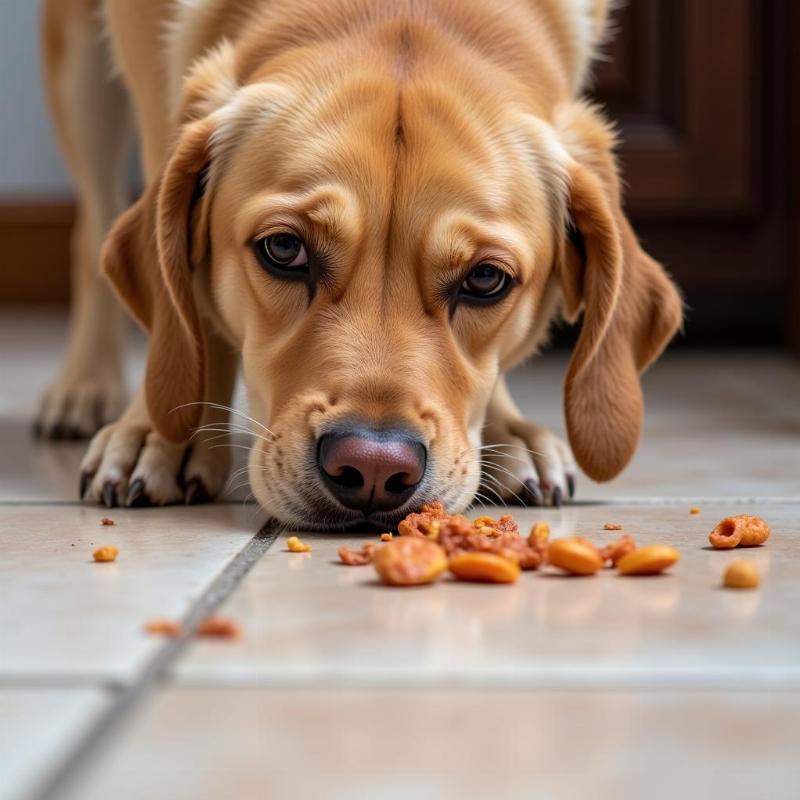Your dog, with those pleading eyes, managed to sneak a peek into the pantry or raid the unguarded trash can. Now, your furry friend is looking uncomfortable, possibly even exhibiting signs of distress. You’re worried because your dog got into food and ate too much. This is a common scenario for many dog owners, and knowing what to do can make all the difference in your pet’s comfort and safety.
What are the Signs of Overeating in Dogs?
Recognizing the signs that your dog has overeaten is crucial for taking prompt action. Some common indicators include vomiting, diarrhea, lethargy, restlessness, abdominal pain (indicated by whining or groaning), excessive drooling, and difficulty breathing in severe cases. In some instances, dogs may also develop bloat, a life-threatening condition where the stomach twists, cutting off blood supply. Bloat often presents with a distended abdomen, unsuccessful attempts to vomit, and signs of extreme discomfort.
 Dog Overeating and Vomiting
Dog Overeating and Vomiting
What To Do When Your Dog Eats Too Much
If your dog got into food and ate too much, the first step is to assess the situation. How much did they consume, and what exactly did they eat? Certain foods, like chocolate, grapes, raisins, onions, and xylitol (artificial sweetener), are toxic to dogs and require immediate veterinary attention. Even if the ingested food isn’t toxic, large quantities can cause digestive upset. Contact your veterinarian or the ASPCA Animal Poison Control Center (APCC) immediately if you suspect your dog has ingested something poisonous or is experiencing severe symptoms.
When to Seek Immediate Veterinary Care
- Toxic Ingestion: If your dog consumed chocolate, grapes, raisins, xylitol, macadamia nuts, onions, garlic, or anything else known to be toxic to dogs, seek immediate veterinary attention.
- Severe Symptoms: If your dog exhibits severe symptoms like difficulty breathing, a distended abdomen, unproductive vomiting (retching without producing anything), or collapse, rush them to the nearest emergency veterinary clinic.
- Underlying Health Conditions: If your dog has pre-existing health conditions like diabetes or pancreatitis, overeating can exacerbate these conditions, requiring prompt veterinary care.
How to Prevent Overeating in Dogs
Preventing overeating is key to your dog’s long-term health. Secure all food storage areas, including pantries, refrigerators, and trash cans. Never leave food unattended on countertops or tables. Establish a consistent feeding schedule and stick to recommended portion sizes based on your dog’s breed, age, and activity level. Avoid free-feeding, which allows dogs to graze throughout the day. Puzzle toys and slow feeders can help dogs eat more slowly and feel fuller for longer.
is it normal for dogs to have double canine teeth
Home Monitoring After Overeating
If your dog ate too much but isn’t showing severe symptoms and didn’t ingest anything toxic, monitor them closely at home. Withhold food for 12-24 hours to allow their digestive system to recover. Provide fresh water in small amounts to prevent vomiting. Once you resume feeding, offer small, bland meals. If symptoms persist or worsen, contact your veterinarian.
Conclusion
Knowing how to handle situations where your dog got into food and ate too much is crucial for responsible pet ownership. By being proactive, recognizing the signs of overeating, and taking appropriate action, you can ensure your furry friend’s health and well-being. Remember, prevention is always the best approach.
FAQ
- What if my dog ate a lot of food but seems fine? Even if your dog appears fine, it’s essential to monitor them closely for any developing symptoms.
- Can I induce vomiting at home if my dog ate too much? Never induce vomiting without consulting your veterinarian. It can be harmful in certain situations.
- How long does it take for a dog to recover from overeating? Recovery time varies depending on the amount and type of food consumed. It can range from a few hours to a couple of days.
- What should I feed my dog after they’ve overeaten? Once your dog’s appetite returns, offer small, bland meals, such as boiled chicken and rice.
- How can I prevent my dog from getting into the trash? Secure your trash can with a lid or place it in a location your dog cannot access.
- Are certain dog breeds more prone to overeating? Some breeds, particularly Labrador Retrievers, are known for their love of food and may be more prone to overeating.
- Is there a way to slow down my dog’s eating? Puzzle feeders and slow-feed bowls can help dogs eat more slowly and feel fuller for longer.
Beautdogs.us is your premier destination for expert advice on dog breeds, care, and stylish living with your canine companion. Whether you’re a seasoned dog owner or just starting your journey, Beautdogs.us offers a wealth of resources to empower you with the knowledge and tools to provide the best care for your furry friend. We specialize in breed-specific guidance, covering everything from nutrition and training to health and grooming. Contact us today for personalized support! Email: [email protected], Phone: +1 501-555-7529. Connect with us on Beautdogs.us for the latest updates and expert tips.